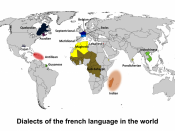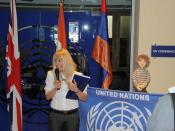Québec's unique culture can only be found within the province's geographical boundaries; Champlain founded these in 1608, precisely four centuries ago. This long routed heritage is culturally symbolic and important to Québécois. Proof of this can be viewed all over the province with the Fleurdelisé, their official flag, flown high. Canada's government has failed repeatedly in respecting their French heritage. The major breaking point is most prominently seen on October 17th 1970 when the radicals of Front de libération du Québec's actions caused the then liberal government to feel an urgency for enacting the War Measures Act. If Canadian governments directed more time and energy-bringing Canada together as a bilingual nation, not an Anglophonic dominated one, problems, like the October Crisis, would never have to be faced. [2: Marcel Rioux. Quebec in question, ed. and trans. James Boake. (Toronto: J. Lorimer, 1978), p. 3. ][3: Government of Québec. An Act respecting the flag and emblems of (Québec: 1999), c.
51, s. 1.][4: The Front de libération du Québec is also otherwise referred to as the "FLQ" for short.][5: J. M. Bumsted. The Peoples of Canada: A Post-Confederation History. 3rd Ed. (Oxford U. Press, 2008), p. 401-2]
Long time problems in the school system pertaining to language rights, and what language was most important, were carried over to present day youth. People felt that one language should not be more dominant over the other. Canadians' opinions stay the same, only differing between the two language groups, however become blatant with any threat of assimilation. This is raised from a lack of support the Government(s) of Canada, past and present, has shown to strengthen bilingualism, rather than one language, in the entire country.
Education in Québec has become over the years increasingly Anglo dominated in the classroom. In 1930-1, the percentage of classes taught in français was 52.2 versus 46.8 percent of classes that were taught in English. In the years before the October Crisis, 1966-7, classes taught in English had risen to 89.2%. These meant classes in français had dropped to 15.9%. This would see another decrease in adjacent years. Long before this, French speaking Canadians had realized; they were surrounded by Anglo dominance, thus there was an importance for an English education. [6: William D. Coleman. The independence movement in Quebec 1945-80 (Toronto: U. of T. Press, 1984), p. 148.][7: Coleman. The independence, p. 148]
In 1851, a small town in Upper Canada had recruited a new teacher for their school, which was primarily filled with French-Canadian children. Their parents had all moved there to ensure they were taught English in addition to their French at home. Upon the new teachers arrival it was found that he was of French origin. The parents of this town were outraged and wrote a letter directly to the Board of Public Instruction expressing that this man was "â¦far from being qualified to be a teacher" and they urged that he was "â¦incapable of giving [their] children a good and wholesome English education-". This shows the urgency there was for those in Lower Canada to move away, acquire the English language, and as a result guarantee prosperity for the future in a land that dealt primarily in English.[8: C. B. Sissons. Bi-Lingual Schools in Canada. (Toronto: J.M Dent & Sons, 1917), p. 14.][9: Sissons. Bi-Lingual Schools. p. 15.]
The depletion of French in the education system represented what the FLQ stood up against in Québec. They expressed in the Manifesto of the Front de libération du Québec that, "[workers] will soon be able to express them [selves] only in English", which shows their hatred towards the idea of English language domination. In October 1970, this attitude was used by Michel Chartrand and Robert Lemieux, FLQ members, to influence over 3000 students and dropouts to "strike, protest, and hold meetings during the crisis". Students were seen by the FLQ as a great voice however, students were more inclined to theory and ideologies of the issue rather than taking actual anarchist action on the FLQ's behalf. If schools all over Québec and Canada adopted a bilingual policy during confederation or earlier, there would have been no English dominance issue, as everyone would have fluency with both official languages.[10: Marcel Rioux. Quebec in question, ed. and trans. James Boake. (Toronto: J. Lorimer, 1978), p. 165.][11: William Tetley. The October Crisis, 1970: an insider's view. (Montréal: McGill-Queen's Press, 2007), p. 20.][12: Tetley. The October, p.20-1.]
Those involved in the FLQ are undoubtedly separatists, believing that their tax dollars only fund an "incentive" for the Government of Canada to speak French. However, it cannot be automatically assumed that all French speaking Québécois, or separatists, which want respect for their heritage, are a part of the FLQ. Some view themselves as "presently citizens of a so-called bilingual Canada, butâ¦" they are aiming to create a unilingual French Québec "â¦without violence, without shock and with justice for all". This is very different from the FLQ's kidnapping and assassination, to "liberate" Québec. [13: Marcel Rioux. Quebec in question, ed. and trans. James Boake. (Toronto: J. Lorimer, 1978), p. 166.][14: Marcel Chaput. Why I am a Separatist. (Toronto: Ryerson Press, 1962), p. 48.]
While the FLQ is in no comparison to this time in history, "Nazi propaganda of the 1930's" promoted the words: "equality, justice, pride, and struggle against unemployment" much like the Manifesto of the Front de libération du Québec. Referring to issues at hand is a great way to seek public support, yet at the fault of the FLQ, they show a fascist arrogance, much like Nazi Germany did, that the everyday populace of Québec is not comfortable with supporting. [15: Gérard Pelletier. The October Crisis, trans. Joyce Marshall. (Toronto: Canadian Publishers, 1971), p. 61]
There was a time during the Trudeau government when "country-wide bilingualism [was] envisioned". When looking further back in time the usage of language is even defined in the British North America Act, 1867; "â¦English or the French language may be used by any person in" Houses of the Parliament, Houses of Legislature of Québec and in courts of Canada. This sounds all encompassing but it must also be recognized "â¦that according to the terms of the act, English is an official language of Québec [yet] French is not an official language of Ontario". This alone would stem a feeling of assimilation to those in Québec who recognize both languages yet it is not the same in its co-founding confederate province. This is why in the 1980s for the first time since 1760 the official language in Québec was changed to be exclusively French. The government of Canada wishes to enforce bilingualism; but they need to be involved in the first place when a Canadians' education starts. This is to ensure that our two official languages become a spoken majority within all provinces, and not have one language becoming closer to an ever-diminishing minority as it is encased in one province.[16: Scott Reid. Lament for a Notion. (Vancouver: Arsenal Pulp Press , 1993), p. 63.][17: C. B. Sissons. Bi-Lingual Schools in Canada. (Toronto: J.M Dent & Sons, 1917), p. 36.][18: Sissons. Bi-Lingual, p. 37.][19: Scott Reid. Lament for a Notion. (Vancouver: Arsenal Pulp Press , 1993), p. 64.]
Once the topic of separation fades, Canada is again at peace with itself. Nevertheless, the whispers and thoughts never leave the minds of Québécois. Separatism is far from new, "it comes back periodically ⦠[which] only proves that it is a feeling deeply embedded in" a Québécois soul. Canada's government is not doing enough to ensure, not only the heritage of Québec is flourished- but also so the sociolect of the whole country thrives and grows as Canada reaches towards a true peace within itself and among its people. [20: Marcel Chaput. Why I am a Separatist. (Toronto: Ryerson Press, 1962), p. 98.]
The October Crisis of 1970, the struggles of Francophone's within an Anglicised dominated society, a lack of access, yet improving, to learn both official languages within the public education system and finally the grouping together of organizations like the FLQ, who feel that they need to kill and destroy to seek attention for one simple change. If more time and energy was directed by the Government embracing and preparing Canada to be a bilingual nation, and not one infected with Anglicization, Canadians/ Canadiens would have no conflict over language and proudly celebrate their French and English roots. For, "a people which wants to live must do much more than keep itself from dying". [21: Chaput. Why I am, p.99.]





